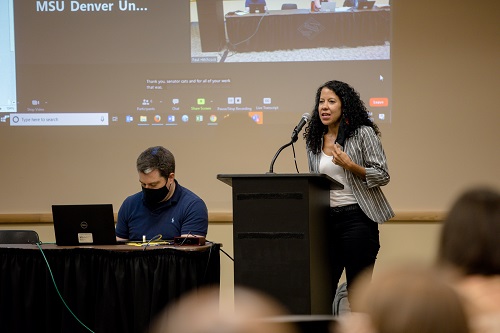Early Bird
Faculty Senate recap
Discussion and vote on moving meetings 100% online, policy on badging/micro-credentialing, transfer-credit cap lifting.
By Cory Phare
November 10, 2021
 The Metropolitan State University of Denver Faculty Senate met Nov. 3 and continued the previous session’s discussion on moving meetings fully online through the end of February.
The Metropolitan State University of Denver Faculty Senate met Nov. 3 and continued the previous session’s discussion on moving meetings fully online through the end of February.
In addition to survey results available on the Senate SharePoint site, in-depth floor commentary in favor and against the measure took place, including:
- Jennifer Gagliardi-Seeley, Ph.D. (Biology), expressed safety considerations as the only departmental senator able to attend who wasn’t currently out sick.
- Christina Foust, Ph.D. (Communication Studies), shared concerns of those seeking medical accommodation while opposing the fully online move.
- Erienne Romaine, M.A. (English), mentioned that two of her colleagues on the Faculty Welfare Committee were out due to illness or injury. One of those colleagues, she said, questioned whether the lack of participation for virtual attendees due to sickness and/or injury constituted an issue covered under the Americans With Disabilities Act (ADA).
- Alex Fayman, Ph.D. (Finance), recounted his recent bout with and recovery from Covid, noting the seriousness of his illness.
- Darcy Beery, M.A. (Journalism and Media Production), noted the inability to participate or vote/object in the current online format.
- Jeremy Castle, Ph.D. (Political Science), discussed the potential modality shift’s impact on tenure-track progression and relationship-building.
- Jenny Allert, DNP/R.N. (Nursing), received a round of applause after noting that “I hope we do not create a culture where we’re expected to work when we’re sick.”
- Courtney Rocheleau, Ph.D. (Psychological Sciences), reiterated the need to focus on healing and supported exploring the viability of an alternative meeting method.
- John Rief, Ph.D. (Communication Studies), echoed the concern for the safety of immunocompromised people while asking if going entirely virtual were fixing the issue with “draconian measures.”
- Chereka Dickersen, Ph.D. (English), noted participatory limitations of in-person meetings due to logistics such as bus schedules and parenting activities. Dickersen also noted that online meetings had been adapted during the pandemic and were the way many organizations were heading.
- Erin Seedorf, DPH (Health Professions), noted that Colorado Covid positivity and hospitalization rates were rising and that the trend was likely to continue into winter.
- Michelle Trujillo, Ed.D. (Education), asked questions about disability and accommodations, noting laxness in safety guidelines such as social distancing.
- Ben Thompson, Ph.D. (Human Performance and Sport), opposed the move online, questioning the logistical ability to provide technical support.
- Summer Trentin, Ph.D. (Art), detailed how she was initially against an online meeting format until coming down with Covid last spring.
- Edgar Maldonado, Ph.D. (Computer Information Systems), opposed the measure, noting how the move could be seen as a position of privilege and from “the ivory tower” by students facing similar safety concerns.
Following discussion, the vote was cast with 45 in favor of moving fully online and 25 opposed. As an operational-structure change would have required a two-thirds vote, the motion did not pass.
Jessica Weiss, Ph.D. (Art History), led a second read of Academic Policy Committee bylaw changes, reflecting the name change of the Student Advisory Council (formerly the Student Government Assembly), adding an academic-advising ex-officio representative and sunsetting the graduate-policy subcommittee due to staffing challenges (with the option to later reintroduce). The subsequent vote passed with 91% supporting the measure.
Weiss also led a first read of a policy proposal on micro-credentialing and awarding digital badges, which would articulate how the credentials (displayable to potential employers on sites such as LinkedIn) would overlay with academic credit; and a proposal to remove maximum credit transfer for ease of major-change logistics (while maintaining residency requirement of 30 credits).
Other items of business included:
- Senate Vice President Liz Goodnick, Ph.D. (Philosophy), the Rules Committee’s Kelly Evans, Ph.D. (Human Performance and Sport), and Faculty Trustee Bethany Fleck Dillen, Ph.D. (Psychology), revisited the discussion around reinstating voting rights to the faculty trustee. As the matter required statewide legislative action to change, nonleadership volunteers (to avoid conflicts of interest) would work a resolution. No motion from the floor was made to further discussion, however, so the conversation was closed.
- Katherine Hill, Ph.D. (Psychological Sciences), provided an update on the handbook-review process. In September, the Senate was tasked to review Section 10 covering major and minor conduct violations and sanctions. Hill reported that this involved clarification as opposed to new or reinvented measures and would be available by year-end for a vote in the spring semester.
- Meredith Jeffers, Ph.D. (Modern Languages), provided a brief update from the Curriculum Committee: Of approximately 70 total proposals submitted, 15 have been vetted and approved thus far.
- The Faculty Senate needs an affiliate faculty representative. Those interested should email President Katia Campbell, Ph.D. (Communication Studies), and Acting Assistant to the Faculty Senate Paul Hitchcock or reach out directly to a Senate officer.
- Faculty representation is still needed for the Digital Measures work group, which meets monthly. Meetings are the first Tuesday of the month from 1:30-3 p.m. Those interested should email Campbellor Goodnick.
Topics: Academics, Events, Faculty Senate, Inclusive leadership
Edit this page